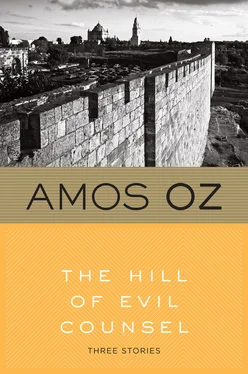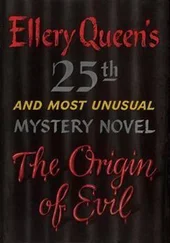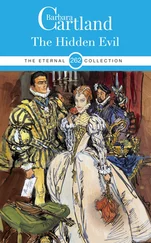"Let the sun rise and let the deed be done. Now!"
At that very moment the sun rose, gigantic, yellow, dazzling the mountaintop to the east, blazing on the Paternoster and Augusta Victoria towers, shimmering on the Mount of Olives, flashing terribly on the wooded slopes, gleaming off the cisterns on all the roofs of Geula, Ahva, Kerem Avraham and Mekor Baruch. I felt like running away, because it looked as though the whole of Jerusalem were on fire.
Everybody, believers and skeptics alike, Mr. Nehamkin, Rabbi Lufban — all watched the sun rise and turned their eyes as one man toward the clock tower. Even the British officer in the armored car looked around.
But the clock had not moved: still three minutes past three.
Far away, in the Geran Colony, a train howled. Somebody lit a cigarette. There was whispering. A woman began to laugh or sob. Then the old man sighed, slipped off the back of the gray donkey, leaned trembling on the arms of his Kurdish bodyguard, and said sadly:
"Another time."
At once, in furious Yiddish, the Venerable Rabbi Zischa Lufban ordered his disciples to send the scoffers and workers of iniquity straight back to the dark holes they had crawled out of and put an end to this blasphemous charade. The British officer, too, finally managed to make his loudspeaker work and gave the crowd five minutes to disperse peacefully.
I elbowed my way through to Mr. Nehamkin.
"Please, Mr. Nehamkin, what's going to happen now?"
He transferred his carved walking stick to his other hand, touched my forehead tenderly, and smoothed my hair back from my eyes. His hand was cold and ancient, but his voice was like a caress:
"We, Uriel, we have stamina. We shall go on waiting."
After a while, the British police appeared from the direction of Romema and began to disperse the throng. But they were powerless to undo what had been done: under cover of the press and tumult, almost as though it had all been prearranged, Ephraim and his comrades had plastered the walls, shutters, telegraph poles, and shopwindows with subversive posters. They proclaimed in inflammatory slogans that the days of Nazi-British rule were numbered, that the Hebrew Underground had passed sentence of death on the High Commissioner and would soon execute the sentence, and that as Judea had fallen in blood and fire, so in blood and fire it would arise again.
Then the saints returned to their synagogue, the Bokharans went their various ways, the shops opened, the mountains gradually caught fire, and another cruel summer's day began in Jerusalem.
3
Whenever he came home from his wanderings, Ephraim would visit us in the late afternoon, to give me a clandestine examination in radio waves and frequencies, to play a game of chess with my father, and to gaze from a distance at my mother.
While my father and Ephraim were absorbed in their game of chess, my mother would sit at the piano, with her face toward the window and her back to the room. Ephraim looked at her not longingly, like the heroes in the pictures, but with an ex-pression that resembled dismay. I myself was dismayed at their silence. At that time, distant sounds of firing could be heard almost every evening in Jerusalem. Father chewed mint leaves: he was always afraid of having bad breath. Ephraim smoked so much that sometimes his eyes watered. Mother played the same étude over and over again, as if she had made up her mind never to move on until she had received an answer. Outside the wind touched the trees as if pleading for silence. But there was silence anyway.
On the sill of the deep-set window that faced north, my battlefields were laid out. Corks, pushpins, silver foil, matchboxes, and empty cigarette packs were battleships, troops, and tanks. I conducted cunning mopping-up operations by the army of Bar Kochba and Marshal Budënny against the Nazi storm troopers. By the middle of the summer holidays my Maccabees had conquered Athens, breached the walls of Rome, burned its palaces and razed its towers, and raced on to besiege Berlin and London. By the time the winter rain and snow made the roads impassable, we would force them to surrender unconditionally.
It was Ephraim who had outlined the strategy.
"Always attack on the flank," he instructed me, "always from the desert, from the forest, from the mountains, always from where you are least expected."
His eyes glowed as he spoke, and he could not keep his hands still. He would add in a whisper, "Only don't trust them. Never trust them. They're all thirsting for our blood."
He it was, too, who hit on the idea of the dry-land submarines, which we called "X-ray subs"; they could travel underground through the sea of molten lava and demolish whole cities by torpedoing them from underneath.
"The earth shall tremble," he would say, "cities shall be burned to ashes, towers shall totter, and only then shall we know rest."
How I loved to see him swell with rage and then subside into silence.
My heart went out to him as he promised me earthquakes, tottering towers, and rest.
I would plead, "But when, Ephraim?"
He would respond with one of his cold, practical smiles. And say nothing.
Worse still, he would suddenly abandon me and tease me mercilessly.
"Now, Uri, you just go on playing with your toys. I've got real work to do. Every detail has to be taken care of well in advance."
All night long, Ephraim would experiment with cosmic radio waves and frequencies, in an attempt to isolate the death ray. If I begged him to give me at least a hint of what the death ray was, he would burst out, with a desperate grin:
"Sting ray. Disarray. Hip-hip-hooray. Why don't you learn to keep your mouth shut and wait for orders like a proper soldier, or else go and play with marbles and tops and paper darts with the other kids. Go on. Scram. Why are you always following me around? What do you think I am, your nursemaid? Go on, now, piss off."
I withdrew from the workshop with my tail between my legs, like a field marshal stripped of his decorations and insignia and ignominiously discharged. I sat down on the cracked stone steps. I tickled myself behind the knees with pine needles. I tried in vain to hypnotize a stupid cat on the garden fence. And repented.
Ephraim and his father the poet ran their small workshop jointly. Mr. Nehamkin received the radios and electrical implements for repair and kept a record of them, collected overdue payments, exchanged views and surmises about the political situation with the customers, adducing evidence from Holy Writ, and entered details of income and expenditure in his copperplate hand in a large ledger. He was empowered to authorize a discount or even credit in certain cases.
Ephraim sometimes allowed his father and me to wind galvanized copper wire onto wooden spools. Once he took advantage of his father's hardness of hearing to promise me in an undertone:
"When he's dead, I'll take you on instead. You can be the poet and cashier then."
At once he changed his mind.
"No, we'll die first, and he'll pronounce flowery orations over our graves. They were lovely and pleasant in their lives, and in their death they were not divided. Surely each night they shall arise and continue to fight the great fight for their people. Someining like that. The war is going to be a tough and bloody one. Only the generations to come will enjoy rest."
When he was not away on his wanderings, Ephraim used to sit all morning daydreaming among the broken irons and phonographs and antiquated radios. Sometimes he would explode with rage and attack these useless gadgets with screwdriver and pliers. He dismantled them completely, combined parts from different sources, and succeeded in transforming a heap of worthless junk into a gleaming piece of modern equipment. His favorite word was "rejuvenation." His work, as he described it, was to rejuvenate antediluvian equipment whose owners had given it up as beyond repair. But when his fit of rage had passed, he lapsed once more into drowsiness. The gray summer dust settled everywhere. Flies buzzed busily, while a spider lay in wait for them in its thicket in the corner. Ephraim would yawn like a whining fox, stretch himself furiously, spit twice on the floor, and repair Mrs. Vishniak's iron almost as an afterthought. Then he would plunge back into his usual morning reverie.
Читать дальше











